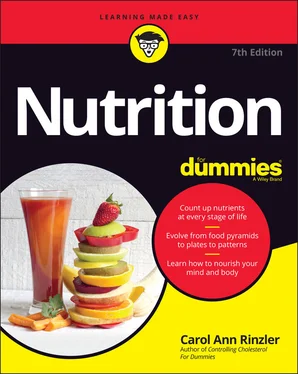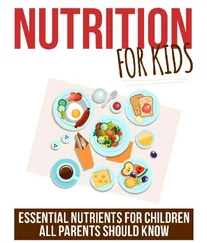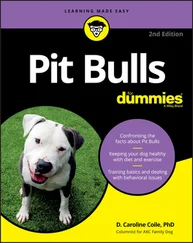And remember: That’s grams of protein, not grams of a high-protein food such as meat, fish, or poultry.
For example, the USDA National Nutrient Database for Standard Reference ( http://ndb.nal.usda.gov ), one of the ten thoroughly reliable sources listed in Chapter 27, provides the following information for grams of meat versus grams of protein:
Chicken: 3 ounces/86 grams breast meat (no bones, no skin), roasted, provides 26.7 grams/0.96 ounces protein
Lean ground beef (7% fat): 4 ounces/113 grams provides 23.6 grams/0.86 ounces protein
Canned salmon: 3.5 ounces/100 grams provides 19.68 grams/0.70 ounces protein
Your daily requirements for micronutrients are much smaller. Consider vitamins. The Recommended Dietary Allowance (RDA) for vitamin C is measured in milligrams (1/1,000 of a gram), while the RDAs for vitamin D, vitamin B12, and folate are even smaller, measured in micrograms (1/1,000,000 of a gram). For more about the RDAs, including how they vary for people of different ages, check out Chapter 3.
Looking at essential nutrients
A reasonable person may assume that an essential nutrient is one you need to sustain a healthy body. But who says a reasonable person thinks like a nutritionist? In nutrition speak, an essential nutrient is a very special thing:
An essential nutrient can’t be manufactured in the body. You have to get essential nutrients from food or from a nutritional supplement.
An essential nutrient is linked to a specific deficiency disease, such as scurvy, the deficiency disease that may afflict people who go without sufficient vitamin C for extended periods of time, or kwashiorkor, the protein deficiency disease. A diet rich in the essential nutrient prevents or cures the deficiency disease, but you need the proper nutrient. In other words, you can’t cure a vitamin C deficiency with extra amounts of protein.
 Not all nutrients are essential for all species of animals. Take vitamin C (and you should, every day). It’s an essential nutrient for human beings but not for dogs because a dog’s body manufactures the vitamin C it needs. Check out the list of nutrients on a can or bag of dog food. See? No vitamin C. The dog already has the vitamin C it — sorry, he or she — requires.
Not all nutrients are essential for all species of animals. Take vitamin C (and you should, every day). It’s an essential nutrient for human beings but not for dogs because a dog’s body manufactures the vitamin C it needs. Check out the list of nutrients on a can or bag of dog food. See? No vitamin C. The dog already has the vitamin C it — sorry, he or she — requires.
Sugar and spice and everything nice well, more precisely water and fat and protein and carbohydrates (the simple and complex sugars described in Chapter 8) and vitamins and minerals.
On average, when you step on the scale, approximately 60 percent of your weight is water, 20 percent is body fat (slightly less for a man), and 20 percent is a combination of mostly protein, plus carbohydrates, minerals, vitamins, and other naturally occurring biochemicals.
Based on these percentages, you can reasonably expect that an average 140-pound person’s body weight consists of about
84 pounds of water
28 pounds of body fat
28 pounds of a combination of protein (up to 25 pounds), minerals (up to 7 pounds), carbohydrates (up to 1.4 pounds), and vitamins (a trace)
You’re right: Those last figures do total more than 28 pounds. That’s because “up to” (as in “up to 25 pounds of protein”) means that the amounts may vary from person to person. Ditto for minerals and carbohydrates.
Why? And how? Because a young person’s body has proportionately more muscle and less fat than an older person’s, and a woman’s body has proportionately less muscle and more fat than a man’s. As a result, more of a man’s weight comes from protein and muscle and bone mass, while more of a woman’s weight comes from fat. Protein-packed muscles and mineral-packed bones are denser tissue than fat.
Weigh a man and a woman of roughly the same height and size, and his greater bone and muscle mass means he’s likely to tip the scale higher every time.
Here are three other examples of nutrients that are essential for some pets and plants but not necessarily for humans:
Myo-inositol: Myo-inositol, an organic compound similar to glucose — the fuel we get from carbohydrates — is an essential nutrient for gerbils and rats who can’t make it in their own bodies and thus must get what they need from food. It’s nonessential for human beings who can synthesize myo-inositol and then use it in dozens of important body processes, such as transmitting signals between cells.
Taurine: The amino acid taurine is essential for cats, but conditionally essential for humans, which means essential for some people but not all. All human bodies except newborns synthesize taurine from the amino acids methionine and cysteine (see Chapter 6), so although adults can make their own taurine, newborns need to get theirs from food, either breast milk or formula. That’s why its essential nature is conditional.
Boron: Several minerals, such as boron, are essential for plants but haven’t been proven essential for either microorganisms, such as bacteria, or for animals, including people.
For more on the vitamins and minerals, amino acids (the so-called building blocks of proteins), and fatty acids that are considered essential for your human body, check out Chapters 6, 7, 10, and 11.
Protecting the Nutrients in Your Food
Identifying nutrients is one thing. Making sure you get them into your body is another. What’s essential is keeping nutritious food nutritious by preserving and protecting its components.
Some people see the term food processing as a nutritional dirty word, or two words. They’re wrong. Without food processing and preservatives, you and I would still be forced to gather or kill our food each morning and down it fast before it spoiled. For more about which processing and preservative techniques produce the safest, most nutritious — and yes, delicious — dinners, check out Part 4.
Considering how vital food preservation can be, you may want to think about when you last heard a rousing cheer for the anonymous cook who first noticed that salting or pickling food could extend food’s shelf life. Or for the guys who invented the refrigeration and freezing techniques that slow food’s natural tendency to spoil.
Or for Louis Pasteur, the man who made it absolutely clear that heating food to boiling kills bugs (microorganisms) that might otherwise cause food poisoning. So give them a hand, right here.
Knowing Your Nutritional Status
Nutritional status is a phrase that describes the state of your health as related to your diet. Malnutrition is what happens when the diet goes wrong. Most people think of malnutrition as the result of diet too low in calories and essential nutrients, such as vitamins, but a diet that delivers too much food leads to malnutrition in the form of obesity. The latter is more common in developed countries with an abundant food supply and a relatively sedentary population. The former may arise from
A diet that simply doesn’t provide enough food: This situation can occur in times of famine or through voluntary starvation due to an eating disorder or because something in your life disturbs your appetite. Among older people, malnutrition may follow tooth loss or age-related loss of appetite or because they live alone and sometimes just forget to eat.
A diet that, while otherwise adequate, is deficient in a specific nutrient: This kind of nutritional inadequacy can lead to a deficiency disease, such as beriberi — the disease caused by a lack of vitamin B1 (thiamine).
A metabolic disorder or medical condition that prevents your body from absorbing specific nutrients, such as carbohydrates or protein: One common example is diabetes, the inability to produce enough insulin, the hormone your body uses to metabolize (digest) carbohydrates. Another is celiac disease, a condition that makes it impossible for the body to digest gluten, a protein in wheat. Need more info on either diabetes or celiac disease? Check out Diabetes For Dummies, by Alan L. Rubin; Diabetes Meal Planning & Nutrition For Dummies, by Toby Smithson and Alan L. Rubin; and Gluten-Free All-in-One For Dummies , a five-books-in-one bargain on living with celiac disease (all books published by Wiley).
Читать дальше

 Not all nutrients are essential for all species of animals. Take vitamin C (and you should, every day). It’s an essential nutrient for human beings but not for dogs because a dog’s body manufactures the vitamin C it needs. Check out the list of nutrients on a can or bag of dog food. See? No vitamin C. The dog already has the vitamin C it — sorry, he or she — requires.
Not all nutrients are essential for all species of animals. Take vitamin C (and you should, every day). It’s an essential nutrient for human beings but not for dogs because a dog’s body manufactures the vitamin C it needs. Check out the list of nutrients on a can or bag of dog food. See? No vitamin C. The dog already has the vitamin C it — sorry, he or she — requires.










